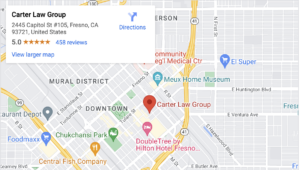Daniel Carter | December 16, 2024 | Personal Injury

You must have a special driver’s license to operate a commercial motor vehicle. Commercial driver’s licenses (CDLs) ensure that a person receives special training and passes specific tests to operate a commercial truck. The goal of requiring a CDL is to reduce the risk of truck accidents.
The Federal Motor Carrier Safety Administration (FMCSA) sets the rules and requirements for obtaining a commercial driver’s license for interstate trucking. Interstate trucking is driving a truck between different states. States follow the FMCSA for interstate trucking, but the laws for intrastate trucking (i.e., operating only within one state) may differ slightly.
California Commercial Driver’s Licenses
California has three types of commercial driver’s licenses. The type of CDL you obtain depends on the commercial vehicle you intend to operate. The three types of CDLs in California are:
Class A Commercial Driver’s License
If you intend to drive a truck weighing 26,001 pounds or more, you need a Class A CDL if the vehicle you tow weighs 10,000 pounds or more. Examples of commercial vehicles that require a Class A CDL include:
- Semi-trucks
- Tanker trucks
- Flatbed trucks
- Vehicles towing double or triple trailers
- Livestock carriers
Class A commercial driver’s licenses allow truckers to drive a wide variety of commercial vehicles.
Class B Commercial Driver’s License
A Class B CDL allows a trucker to operate a single vehicle weighing 26,000 pounds or more or a vehicle towing a trailer weighing less than 10,000 pounds. A Class B CDL also allows drivers to operate a 3-axle vehicle weighing over 6,000 pounds.
Examples of Class B vehicles include:
- Dump trucks
- Passenger buses
- Box trucks
- City buses
- Tour buses
In addition to operating vehicles classified as Class B commercial vehicles, a driver may also use their Class B commercial driver’s license to operate some vehicles requiring a Class C CDL.
Class C Commercial Driver’s License
You must have a Class C CDL to operate a vehicle transporting 16 or more passengers, including yourself. Class C licenses are also required if you intend to transport hazardous materials (HAZMAT). A driver with a Class C CDL can also operate passenger vans and HAZMAT trucks.
Endorsements to Commercial Driver’s Licenses
A driver may apply for one or more endorsements for their CDL. The endorsement allows the driver to operate specific types of vehicles or haul specific types of loads. Examples of endorsements include:
- T – Double and triple trailers
- N – Tank vehicle
- P – Transport passengers
- S – School buses
- H – Hazardous materials
- X – Combination of tank vehicle and hazardous materials
You must meet additional requirements to obtain an endorsement. The requirements vary depending on the endorsement, but many endorsements require a separate knowledge test.
Requirements for California Obtaining a Commercial Driver’s License
You must meet several requirements to obtain a commercial driver’s license in California. The requirements for a CDL in California include, but may not be limited to:
- Meet federal medical standards
- Pass a TSA background check for HAZMAT endorsement
- Take and pass a drive and skills test
- Pass the applicable knowledge test for the class/endorsement
- Minimum number of hours of training behind the wheel for some classes
In addition to the above, all commercial driver’s license applicants must complete the federal Entry Level Driving Training (ELDT). ELDT training does not need to occur in California for you to apply for a California CDL. However, you must complete the program with a provider registered on the Training Provider Registry.
Why Is It Important to Require Additional Training and Skills for Commercial Truck Drivers?
Commercial truck accidents cause devastating injuries for accident victims. An 80,000-pound truck can crush passenger vehicles, causing wrongful deaths and life-altering impairments. Additional training may help reduce the number of truck accidents by ensuring truck drivers understand the risks of dangerous driving behaviors such as:
- Speeding and reckless driving
- Drowsy and fatigued driving
- Road rage and aggressive driving
- Driving under the influence
- Failing to follow traffic laws
- Making unsafe maneuvers
- Distracted driving
The training programs also emphasize the importance of inspecting and maintaining trucks and the correct ways to load and secure cargo. Numerous parties could share liability for a truck accident case, including trucking companies, truck drivers, loaders and shippers, maintenance and repair facilities, and truck manufacturers.
Do I Need a Fresno Personal Injury Attorney to File a Truck Accident Claim?
You could be entitled to economic and non-economic damages if you were injured in a truck accident. However, truck accident cases are complex personal injury claims. Trucking companies and their insurance provider aggressively fight claims. They have teams of investigators, adjusters, and lawyers to protect them from liability.
Hiring an experienced truck accident attorney gives you a better chance of receiving the compensation you deserve for a truck accident claim. Call Carter Law Group for a free consultation with an experienced Fresno truck accident lawyer to discuss how we can help you with a truck accident claim.
Visit Our Personal Injury Law Firm in Fresno, CA
Carter Law Group
2445 Capitol St #105, Fresno, CA 93721, United States
(559) 485-1212

